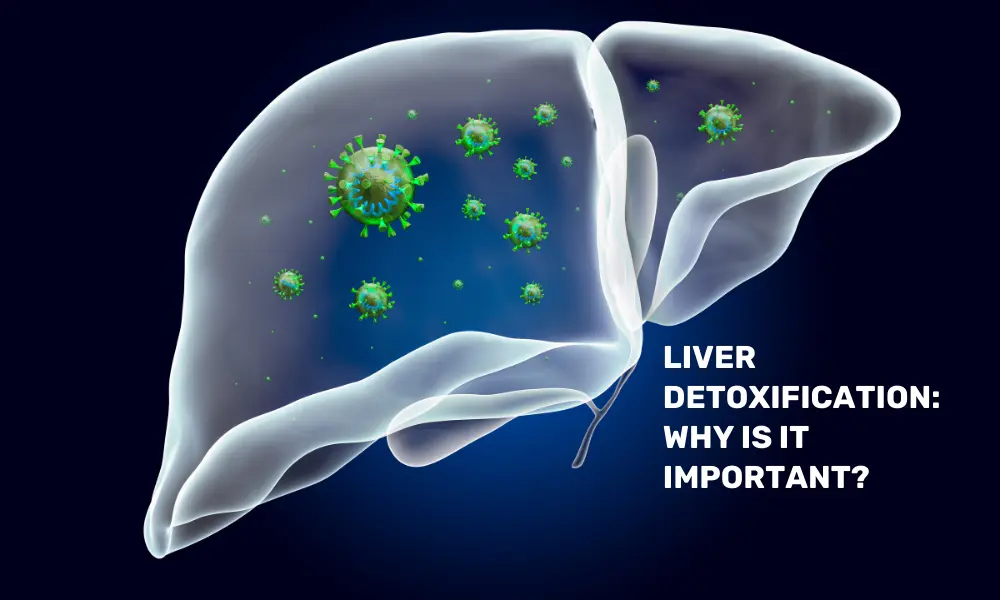Liver is one of the most vital organ located in the upper right abdomen. It plays an important role in maintaining overall health. Its primary functions include detoxification, metabolism, protein synthesis, and the production of biochemicals that are vital for digestion. The Liver filters and processes blood, removing toxins and waste products.
What is Liver Detoxification?
Liver detoxification is the process through which the liver filters and removes toxins from the bloodstream. It involves a complex series of biochemical reactions that convert harmful substances into less toxic or water-soluble forms, allowing them to be excreted from the body through urine and bile.
Benefits of Liver detoxification
The liver’s key role is to break all sorts of toxins into waste material, which is then thrown out. But when you put a lot of pressure on the Liver, it becomes toxic and loses its efficiency, and that is when it calls for detoxification.
During detoxification, the Liver undergoes two main phases.
In Phase I, enzymes, particularly from the cytochrome P450 family, convert harmful substances into more reactive forms through oxidation, reduction, and hydrolysis.
These intermediate metabolites are then neutralized in Phase II through conjugation reactions, where they are combined with molecules like glutathione, sulfate, or glucuronic acid to form less toxic, water-soluble compounds. These compounds are subsequently excreted from the body via bile or urine. Nutrients such as vitamins C and E, amino acids, and selenium, support these processes.
A healthy balanced diet, sufficient hydration, and minimizing exposure to toxins are essential for optimal liver function and efficient detoxification, highlighting the Liver’s important role in protecting our body from toxic and harmful substances.
What makes the Liver toxic?
Packaged foods, preservative-laden foods, refined carbs, refined sugar, refined oil, trans fats found in packaged chips and namkeens, heavy dinners, alcohols, smoking, and overuse of modern medicines leads to Liver getting toxic. Insufficient sleep also impacts the functioning of the Liver, as it doesn’t get time and scope to heal or recharge itself.
How to do Liver Detoxification?
Individuals can reduce their risk of liver-related conditions by making healthy dietary choices and promoting overall well-being.
Turmeric
Turmeric contains curcumin, which has unbelievable anti-inflammatory and antioxidant properties. Consuming turmeric regularly can help reduce liver inflammation and prevent oxidative damage to liver cells. One can add turmeric to curries, soups, or smoothies for a flavourful and liver-boosting addition to your diet.
Green Tea
Green tea contains catechins, powerful antioxidants that protect the Liver from any damage and improve liver function. Drinking green tea regularly can help reduce liver fat accumulation, inflammation, and oxidative stress, promoting optimal liver health. Enjoy a refreshing cup of green tea as part of your daily routine to support liver health.
Citrus Fruits
Citrus fruits like lemons, oranges, and grapefruits are rich in antioxidants, and vitamin C that help stimulate liver detoxification enzymes and support liver function. Drinking freshly squeezed citrus juices or adding slices of citrus fruits to water can help keep your Liver healthy and hydrated during summer.
Watermelon
Watermelon is a delicious and hydrating summer fruit and beneficial for liver health. Rich in antioxidants like lycopene and vitamin C, watermelon helps protect liver cells from damage caused by free radicals. Additionally, its high water content aids in flushing toxins out of the body and promoting optimal liver function.
Leafy Greens
Leafy greens such as kale and spinach are excellent sources of chlorophyll, a natural detoxifier that supports liver detoxification processes. These greens are also rich in vitamins, minerals, and antioxidants that help reduce inflammation and support overall liver health.
Fatty Fish
Fatty fish like salmon, mackerel, and sardines are rich in omega-3 fatty acids, which have anti-inflammatory properties and help reduce liver fat accumulation. Consuming fatty fish regularly can help protect against non-alcoholic fatty liver disease (NAFLD) and promote liver health. Grill or bake fatty fish for a delicious and nutritious addition to your summer meals.
The Liver plays an important role in metabolism, and nutrient storage, ensuring the body’s overall health and vitality. Individuals can reduce their risk of liver-related conditions by making healthy dietary choices and promoting overall well-being.
FAQ on Liver detoxification
Why is detoxification necessary?
Detoxification is important because it helps the body get rid of waste and toxins, improving our health and the body’s systems.
What happens if the Liver does not get detoxified?
If the liver does not get detoxified properly, toxins can build up in our body, causing symptoms like fatigue, digestive issues, skin problems, mood swings, hormonal imbalances, and more serious complications like liver damage, cirrhosis, and liver failure.
How do you tell if your liver is detoxified?
Increased energy levels, improved digestion, clearer skin, better mood, reduced bloating, less cravings, better sleep are few signs of detoxified liver.





